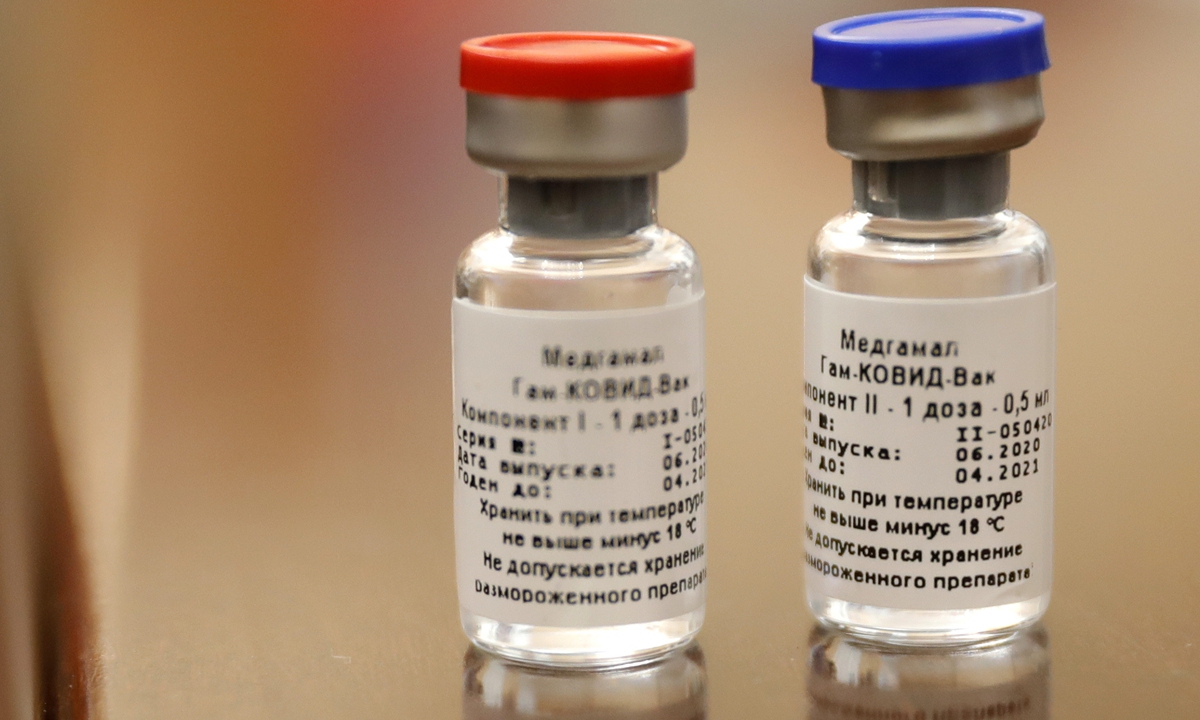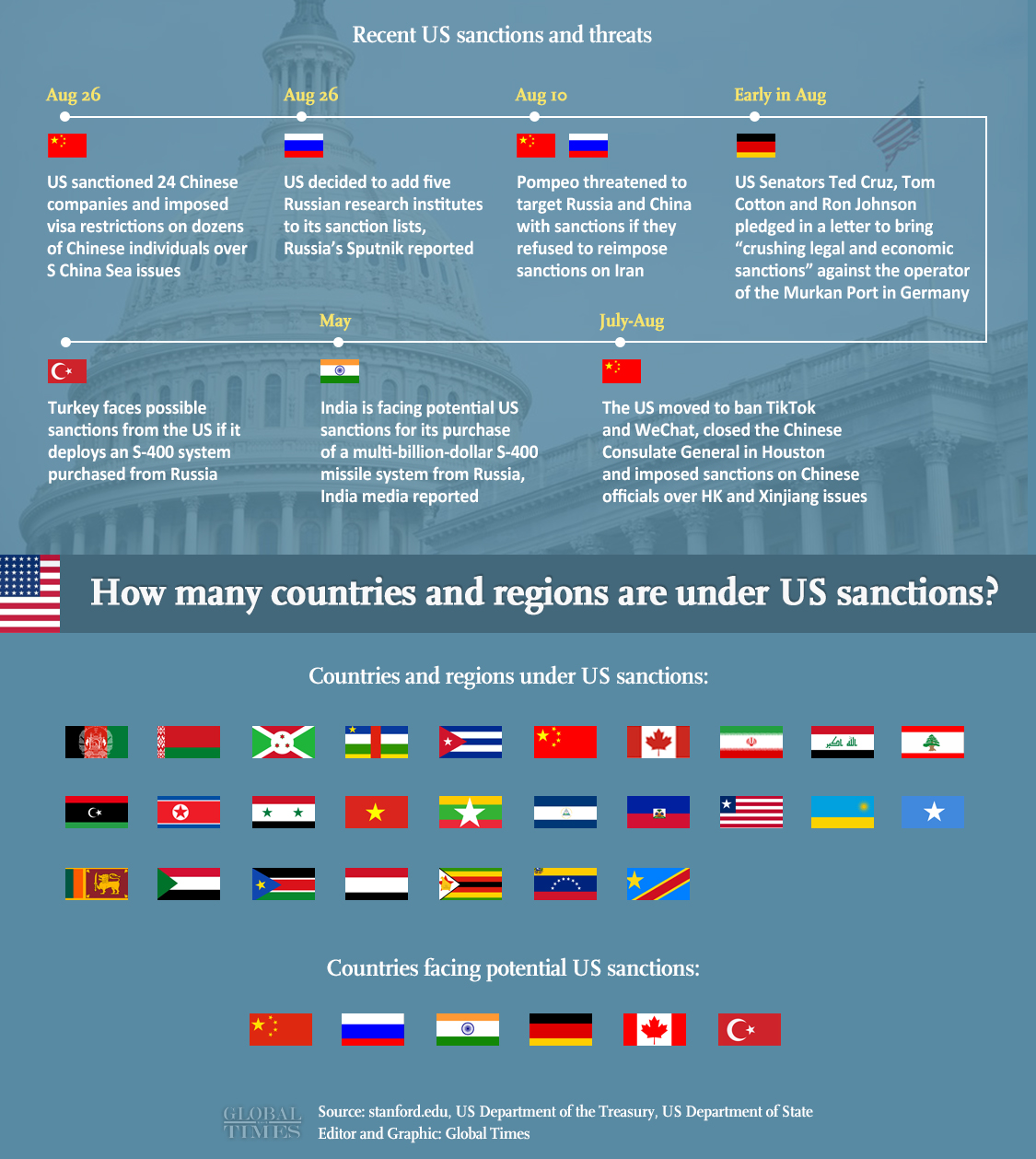A new greeting: I've been sanctioned by the US, and you?
By Deng Xiaoci Source: Global Times Published: 2020/8/27 15:03:28 Last Updated: 2020/8/27 16:03:28
Bully moves a loser's game, reflects deteriorating power: analysts

Russia vaccine Photo:VCG
"I've been sanctioned by the US, and you?" This could just be a new greeting routine in the international community, with US sanctions becoming increasingly random and rampant.
Well, here comes another round. Chinese netizens who learned that the US had just added 24 Chinese firms onto its sanction list for their role in the South China Sea before going to bed on Wednesday evening, woke up on Thursday to find that the world's largest economy has reportedly just slapped new sanctions on the Russian Defense Ministry Research Institute, which worked on a COVID-19 vaccine.
Many netizens and observers said that they are becoming numb and tired of US bullying moves through sanctions. According to incomplete statistics, as of August, at least 30 countries around the world have been hit by US sanctions.
Russia's Sputnik reported on Wednesday that the US has added five Russian research institutes to its sanction lists, including the Defense Ministry Research Institute that was involved in work on the COVID-19 vaccine, citing the US Department of Commerce statement.
The US claimed the listed institutions are working on chemical and biological weapons, the report said. Listing by the US Department of Commerce would mean that US authorities impose restrictions on export, re-export and transfer of goods in line with the existing regulations on individuals and organizations that are deemed as posing a risk to US national security and foreign policy interests.
The Russian COVID-19 vaccine, dubbed Sputnik V, was developed by the Moscow-based Gamaleya Research Institute and the Russian Defence Ministry and officially registered by the Russian government on August 11, marking a first in the world.
Song Zhongping, a military expert and TV commentator, said on Thursday that the US is playing a loser's game, and if it cannot compete in the vaccine race, it beats whoever is leading.
"The US is trying to slow down Russia's development of the vaccine by hindering its cooperation with the world, including US institutions," Song said.

Infographic:GT
Having very much become used to US sanctions, netizens from China commented on the US bullying move on social media with humor. The hashtag for "US sanctioning Russian COVID-19 vaccine developing institutions" soon gathered some 220 million views as of Thursday afternoon.
The US must have been a tailor in its previous life, as it has to cut things with sanctions every now and then, wrote one Sina Weibo user, whose comment was liked nearly 20,000 times.
Whoever is fighting the virus and making progress against it, the US hits with sanctions, which means the next in line could be Chinese medical workers, wrote another.
Russia must have stolen US technology that is not yet known to the US, mocked another.
Reuters reported on Wednesday that Russia is preparing to approve a second vaccine against COVID-19 in late September or early October and the final phase of clinical trials on "Sputnik V" was also beginning, with 40,000 people expected to participate. Similar trials will also be carried out in five other countries.
"As the most developed country with the greatest strength and the only superpower in the world, the US wantonly imposes sanctions or threatens to sanction others, which is just pathetic," said Chinese Foreign Ministry spokesperson Hua Chunying during a routine press conference on July 15.
We hope "sanctions" are not going to be the biggest and shiniest label that the US wants itself to be remembered by, and it should earnestly reflect on its policies, she noted.
Despite Hua's kindly heads-up, the US has not shown any self-control or dignity when it comes to sanctioning other nations at will.
On Wednesday, the Trump administration added 24 Chinese companies to a government list that bans them from buying American goods due to their roles in the South China Sea.
US Secretary of State Mike Pompeo also threatened on August 10 to target Russia and China with sanctions if they refuse to reimpose sanctions on Iran, which came after Russia and China voted against the US resolution to extend a 13-year-old arms embargo on Iran at the UNSC.
And in recent weeks, the Trump administration moved to bar the Chinese-owned social media apps TikTok and WeChat, shut down the Chinese Consulate General in Houston and placed sanctions on Chinese officials and entities over so-called human rights violations.
But the US sanction threats are just as cheap as the sanctions themselves.
Early in August, US Senators Ted Cruz, Tom Cotton and Ron Johnson pledged in a letter to bring "crushing legal and economic sanctions" against F?hrhafen Sassnitz GmbH, the operator of the Murkan Port in Germany, where Russian vessels are helping build the Nord Stream 2 natural gas pipeline.
The US senators described the pipeline as a "grave threat to European energy security and American national security." Germany's foreign minister has expressed dismay to his US counterpart over the threat, media reported on August 10.
India is also facing potential US sanctions for its purchase of a multi-billion-dollar S-400 missile system from Russia, India media reported in May. And for the very same reason, Turkey also met with sanction warnings from the US if it deploys an S-400 system purchased from Russia.
The Canadian federal government has reportedly been in discussions with the Trump administration on US travel bans and other sanctions over personnel at the International Criminal Court, which potentially includes dozens of Canadians and their families.
According to the Stanford University's website, countries that are under comprehensive US sanctions include Cuba, Iran, North Korea and Syria.
And countries with restricted parties on the US Export Administration Regulations include China, Canada, Germany, South Korea and the UK, according to the website.
The US' frequent use of sanctions shows that it has run out of political moves to pressure the rest of the world, and its global governing capability has significantly deteriorated, Song told the Global Times on Thursday.
However, the more countries it impose sanctions on, the greater the chance of the US being isolated, and eventually, it will find itself in a lose-lose situation, Song noted.
Newspaper headline: US wanton sanctions mocked online
Posted in: DIPLOMACY